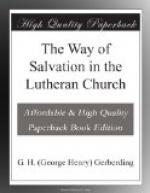How directly contrary to all this is the unscriptural idea, not only of entire sanctification, but of instantaneous sanctification. Surely, in this fast age, many have run far ahead of prophets, apostles, martyrs, reformers and the most eminent saints of all ages. As we read the lives and words of these heroes of faith, we find that the more Christ-like and consecrated they were, the more did they deplore their slow progress and their remaining sin.
While, therefore, we have no Scripture warrant to expect sinlessness here, while we must “die daily,” “mortify our members_,” and “fight the good fight of faith,” between the old Adam, whose remnants cleave to us, and the new man in Christ Jesus, we can still do much to promote our sanctification, and make it more and more complete. We can use the powers that God has given us to carry on the warfare with sin. We can increase these powers, or rather permit divine Grace to increase them, by a diligent use of the means of Grace. In the chapter on the Word of God as a means of Grace, we showed that the Holy Spirit sanctifies through the Word. In the chapters on baptism and the baptismal covenant, we showed how that holy sacrament is a means of Grace, whose efficacy is not confined to the time of its administration, but that it is intended to be a perennial fountain of Grace, from which we can drink and be refreshed while life lasts. In the chapters on the Lord’s Supper, we learned that it also was ordained and instituted to sustain and strengthen our spiritual life.
We have, therefore, all the means necessary for our sanctification. Do we prayerfully use them? Might we not be much further on in the work of holiness than we are? Do we use the truth as we should, that we maybe “sanctified through the truth?” Do we “desire the sincere milk of the Word, that we may grow thereby?” Does it “dwell richly among us?” Know we not, or have we forgotten it, that “as many of us as have been baptized into Christ, were baptized into His death?” Do we say, with those early Christians, “henceforth let no man trouble me, for I bear in my body the marks of the Lord Jesus?” And when we go to our Lord’s Table do we realize that His “flesh is meat indeed, and His blood is drink indeed?” Do we go in the strength of that heavenly nourishment many days? Might we not, by making a more sincere, hearty and diligent use of all these means of Grace, live nearer to Christ, lean more confidingly on Him and do more effectually all things through Him who strengthened us?
Yes, doubtless, we must all confess that it is our own fault that we are not sanctified more fully than we are; that if, in the strength derived from a proper use of the means of Grace, we would watch more over self, pray more, meditate more on divine things and thus surround ourselves more with a spiritual atmosphere, we would be more spiritual. “This is the will of God, even your sanctification.” “Without holiness, no man shall see the Lord.”




